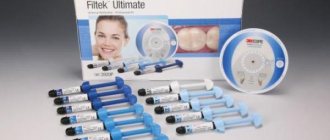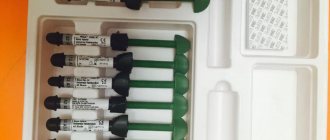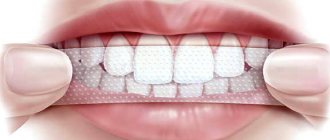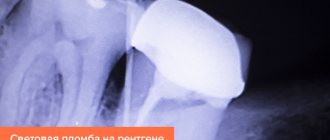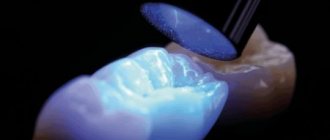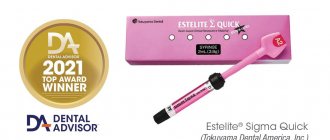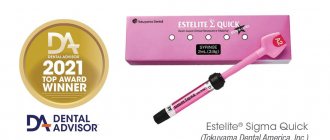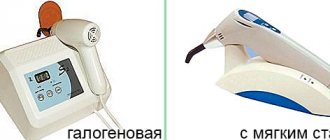Carious disease manifests itself in many cases quite unnoticed, very often having a small black dot in the tooth; when visiting the dentist, very deep caries is discovered.
Basically this confuses us and we immediately start thinking about what we should do, what material is better to use and how much it will cost us. We can answer all your questions without difficulty.
We want to tell you and offer the modern nanocomposite material Filtek. Its application is very wide, from the smallest restorations to filling large volumes of voids. In this article we will tell you about what Filtek restoration fillings are. About the areas in which they are used. We will also talk about the undoubted advantages of this light-curing material. And of course we will tell you about the different types of Filtek fillings.
What are Filtek fillings?
Filtek fillings are the word quality in the highest form of restoration materials from the American manufacturer - 3M ESPE. Similar nanocomposite materials for filling are used all over the world. With their use, it is possible to restore dental aesthetics, excellent anatomical shape and chewing function.
In what areas are Filtek materials used?
Filtek material is a nanocomposite material, its use is very extensive. Unlike many other materials, Filtek is used not only in the restoration of chewing teeth, but also in cases where it is necessary to restore the aesthetics of the front teeth. This material is universal!
Let's now list the undoubted advantages of this material!
Tetric N-Ceram filling
Tetra N-Ceram is a professional composite restorative material. The reflective filling has a wide range of natural shades. Tetrik Kerom is used for filling grades 1-5, in pediatric dentistry, in the manufacture of direct veneers, and restoration of veneers. The material is used in a dry working area. The material is flexible and easy to use. Used to work on front and side teeth. Has a “chameleon” effect.
Advantages of Filtek fillings
- Filtek fillings are used not only in frontal teeth, but also in chewing ones
- Low landing
- Reproducibility of natural properties of enamel and dentin
- High aesthetics and smoothness.
- Good wear resistance.
- Material from a well-known company provides a guarantee of effective treatment
- Of course, this manufacturer has a huge range of colors.
Now let's talk about the types of Filtek filling material.
What material is better for fillings on the chewing surface?
Most likely, the dentist will offer you a choice of several materials that differ not only in their features, durability, but also in price. Choose the most expensive option available to you; it will last longer and look better.
The most expensive fillings in the world are installed in the UK. One trip to the dentist and an ordinary cement filling, which in Russia can be placed under a compulsory medical insurance policy, will cost a couple of hundred dollars.
At the Clarimed clinic you can fill a tooth for 1,155 rubles (CIS). The consultation is free, as are any questions about fillings, treatment plans, prices, durability, or anything else that worries you before the procedure. Call us, we work around the clock.
Types of Filtek filling material:
There are three types of Filtek fillings: Filtek Z250, Filtek Supreme and Filtek Ultimate.
So, the first one: Filtek Z250 - this material has good density, which allows it to adhere well to the edges of the teeth. This material is used in the so-called layer-by-layer technique, which means the moment when the filling is built up and more than one layer is used. This material minimizes the recurrence of caries to almost zero.
Second: Filtek SupremeXT - this material is great for making veneers or inlays. This material has a large number of shades, which makes it an excellent option for the restoration of front teeth.
And finally the third type: Filtek Ultimate - this material is newer, it was developed to improve and improve the Filtek Supreme material. It's essentially the same thing, but it has an improved formula for long-lasting shine. This material is also more convenient for the dentist to use, which will make the procedure faster.
Advantages of the material
Not every filling material has these advantages:
- The high level of density ensures excellent edge seal.
- Photopolymerizability.
- An alternative for the implementation of multi-layer restorations.
- After use, an excellent aesthetic appearance is guaranteed.
- Easy to polish.
- High level of wear resistance.
- Low shrinkage, about 2%.
- Easy to use, does not stick to tools.
- Large selection of shades.
Having such advantages, the material is very popular among dentists.
Our clinics
Clinic "Elident" on Varshavskaya
Varshavskoe highway, 75, bldg. 1, Moscow 117556
- Varshavskaya (500 m, closed until 2021)
- Nakhimovsky Prospekt (1,300 m)
Mon-Sat : 09:00-21:00; Sun : 09:00-19:00.
Online registration
+7 (495) 649-41-19
Elident Clinic in Annino
Varshavskoe highway, 154, building 1, Moscow 117405
- Annino (500 m)
- Academician Yangelya (700 m)
Mon-Sat : 09:00-21:00; Sun : 09:00-19:00.
Online registration
+7 (495) 649-41-19
Work technology
Let's consider what the technology for working with the Filtek Z250 material is. The instructions recommend the activities described below.
Preparatory procedures:
- Clean your teeth from plaque. You need to use pumice and water. This will help you determine the color correctly.
- Determine whether there are concomitant diseases and contraindications to the installation of a filling.
- Determine the depth of the restoration. The shade will depend on the thickness of the material.
Typically, the dental plate is divided into three parts:
- Cervical. Use material in yellow shades.
- Average. Yellowish, brownish and gray shades are used.
- Cutting edge. Use blue and gray tones.
For restoration, it is necessary to work with the material to determine the thickness and shape, as well as to select the required shade. A trial application will help you achieve optimal results.
Next, the tooth is isolated from the gum and cheek. To do this, use a rubber dam or cotton rolls with a saliva ejector.
Prices for caries treatment
| Service | Price, ₽. |
| Examination of the patient, calculation of the cost of services | for free |
| Light polymer (Light) filling Estelite | 2800 |
| Light-polymer (Light) filling Vitrimer | 2700 |
| Light polymer (Light) filling Filtek | 2500 |
| Fuji glass ionomer cement | 2200 |
| Light-polymer (Light) filling Revolution (for a crown) | 1800 |
| Treatment of average caries MOD Estelite | 4000 |
| Treatment of average caries MOD Filtek | 3800 |
| Treatment of medium caries MOD Fuji | 3500 |
| Grinding the filling | 350 |
| Temporary filling with Septopak medicinal preparations | 550 |
| Temporary filling (dentin) | 300 |
| Temporary light filling Clip | 400 |
| Fuji insulating gasket, revolutionary | 450 |
| Light polymer therapeutic pad | 450 |
| Fiberglass pin | 1600 |
| Anchor pin | 800 |
| Titanium pin | 1500 |
| Additional surface no more than one Estelite | 800 |
| Additional surface no more than one Filtek | 600 |
| Additional surface no more than one Fuji | 500 |
| Aesthetic restoration of anterior teeth according to class III | 3500 |
| Aesthetic restoration of anterior teeth according to class IV | 3800 |
| Clinical/home whitening | 6500-8500 |
Stages of dental filling
- anesthesia for tissue pain relief,
- the area affected by caries is completely drilled out,
- When treating pulpitis or periodontitis, endodontic treatment of the tooth canals is additionally carried out - the dental nerve is completely removed, or if it is slightly damaged, a drug is placed inside the tooth under a temporary filling. Treatment of periodontitis is always carried out in several stages - the product is placed at the base of the dental canals to relieve inflammation of the tissues around the tooth,
- the cavity inside the tooth is treated with antibacterial drugs, disinfected and thoroughly dried. If necessary, a therapeutic pad is placed,
- the filling material is selected according to color, which is especially important when restoring teeth in the frontal area of the smile,
- The filling material is gradually applied to the tooth, carefully compacted inside (so that there are no air bubbles),
- The installed filling is ground and polished, and given the desired shape.
Expert opinion
Elina Ruslanovna Dzagurova Dentist-therapist Work experience 10+
“At the final stage, we invite the patient to take an active part in the treatment process. It is imperative to inform your doctor about the discomfort caused by the filling - this is the only way to fit it perfectly and avoid inconvenience in the future.”
After installing a dental filling
After filling teeth, the patient must follow the following recommendations: refrain from eating for 1.5-2 hours (which is especially important when installing a filling made of a chemical composite, since the material takes time to completely harden). During the day after treatment, it is advisable not to consume foods that can lead to staining of the material.
The durability of the filling depends on the quality of its installation, the tightness of its fit to the tooth and how responsibly the patient monitors oral hygiene: it is necessary to brush the teeth daily and consult a dentist at least 1-2 times a year for a preventive examination and professional hygiene .
Indirect restoration
Indirect restoration includes the following stages of work:
- Preparatory work as described above. Selecting the shade and cleaning the surface.
- The tooth is processed for the chosen type of structure.
- The impression is taken.
- A plaster model is made in the laboratory.
- A layer of separator is applied to it so that it can be easily removed.
- As with direct restorations, the composite is applied in layers.
- The design is polished and tried on the model.
- The prosthesis is installed in the patient’s oral cavity and fixed. If revision is necessary, it is returned to the laboratory.
- It is necessary to create a non-smooth surface on the inner surface.
- The prosthesis must be cleaned in soapy water using ultrasound.
- Rinse under running water and dry thoroughly.
- Then the prosthesis is fixed with composite cement.
Some tips for working with Filtek Z250 material:
- Each layer is applied layer by layer.
- For the shade “Filtek Z250” UD, the layer should be no thicker than 2.0 mm.
- Curing time is 20 seconds for shades A1, A2, A3, A3.5, A4, B1, B2, B3, C3, D3, I.
- Each layer should be polymerized.
- Curing time is 30 seconds for shades B0.5, C4, UD.
- Do not create layers thicker than 2.5 mm.
When dealing with modern restoration materials, there are certain rules. This also applies to Filtek Z250. We will consider a description of the subtleties that need to be taken into account when working.
Clinical manifestations and diagnosis of superficial caries
Superficial caries is the second stage of initial caries and is characterized by the appearance of a pigmented spot that cannot be remineralized. It has a dirty-grayish color and is often covered with plaque. It acquires its color under the influence of pigments of pathogenic bacteria, and its presence is a sign that the processes of destruction of hard dental tissues have begun. Clinical manifestations of superficial caries are as follows:
- Moderate pain for short periods during which the affected tooth is exposed to thermal, mechanical or chemical irritants;
- When a carious lesion is located on the contact surface of a tooth, inflammatory processes in the adjacent periodontal papilla are often observed, accompanied by swelling and bleeding.
Due to the fact that the symptoms of the disease are not pronounced, patients rarely seek dental care in a timely manner. The disease is detected during preventive examinations, which must be thorough enough for this. When probing the affected tooth, the patient notes pain, and the doctor identifies a shallow cavity filled with softened pigmented enamel.


